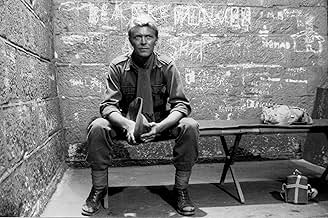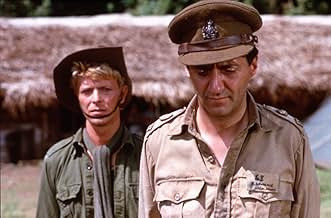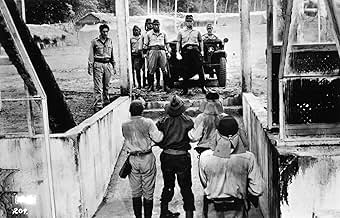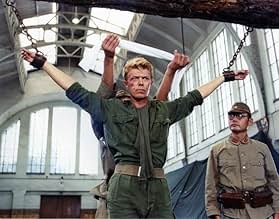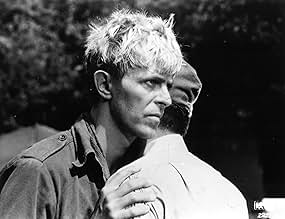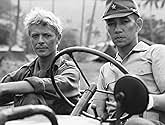Durante a Segunda Guerra Mundial, um coronel britânico tenta superar as diferenças culturais entre um prisioneiro de guerra britânico e um comandante japonês para evitar o derramamento de sa... Ler tudoDurante a Segunda Guerra Mundial, um coronel britânico tenta superar as diferenças culturais entre um prisioneiro de guerra britânico e um comandante japonês para evitar o derramamento de sangue.Durante a Segunda Guerra Mundial, um coronel britânico tenta superar as diferenças culturais entre um prisioneiro de guerra britânico e um comandante japonês para evitar o derramamento de sangue.
- Direção
- Roteiristas
- Artistas
- Ganhou 1 prêmio BAFTA
- 10 vitórias e 8 indicações no total
- Hara
- (as Takeshi)
- Kanemoto
- (as Johnny Ohkura)
- Commandant of Military Prison
- (as Yuya Uchida)
- President of the Court
- (as Ryunosuke Kaneda)
- Lieutenant Iwata
- (as Takashi Naito)
- Interpreter
- (as Rokko Toura)
- PFC Yajima
- (as Yuji Honma)
- Direção
- Roteiristas
- Elenco e equipe completos
- Produção, bilheteria e muito mais no IMDbPro
Avaliações em destaque
The acting in the movie is adequate without ever being great (the notable exception being Tom Conti who is fantastic in his role as the misunderstood titular character).
However, the movie moves beyond the acting and once you are embroiled in the atmosphere and realism you become oblivious to any acting shortcomings.
The movie must be one of the most accurate depictions of human nature in a war. It has a diverse range of characters yet none of them becomes a caricature. It certainly doesn't sink into the good vs evil mindset that many war movies do.
The violence is graphic and shocking despite lacking the visceral realism of Spielberg's later war movies.
The ending of the movie still affects me, even after repeated viewings. I still have to a lump or two to stop from crying even now.
Overall, recommended for anyone with an interest in a non-stereotypical movie about war. Not for the faint of heart though.
To fully appreciate MCMR, try to understand the culture of both the captors and the prisoners at the time. To the prisoners, their existence in the camp is an unfortunate result of war, and should be temporary and not a life or death experience. To the Japanese captors, the prisoners who surrendered rather than died fighting are cowards, beneath the notice of the captors and likely not even viewed as human beings. They are expendable. But first, in this particular camp, there is an effort to "educate" the prisoners about the way a *true* warrior lives life (and dies). That is where the true conflict begins.
There are multiple physical and psychological struggles going on in MCMR. There is even some homoeroticism, though it isn't fully explained. There is certainly a lot of sadness, for characters on both sides. This point is brought home at the end, when the roles are reversed for two of the characters.
Even today, I can hum several parts of the score to MCMR, and they make me melancholy as I recall scenes from the movie. If you like movies that delve into the darker side of the human spirit (with some lightness thrown in), check out MCML. I rated it an 8.
The story is completely about perspectives and motives: power-madness and despair. Some might find MCML hard to stomach while watching, some afterwards. But I say you have to watch it through to appreciate the concepts fully. Moreover, I say you shouldn't vote it before you've seen all of it; that way the rating wouldn't be as low as 6.9. MCML is one of those films that surpass movies like 'Platoon' (Stone, 1986) on any level. Added to all that, it's also beautifully shot by cinematographer Toichiro Naroshima (Double Suicide).
One of the best scores in history of cinema by Ryuichi Sakamoto (also 'Wild Palms' and 'Sheltering Sky'), who not only provides it with his strokes of musical genius, but also plays an important role: the androgynous and curious captain in contrast to the virility of Takeshi Kitano (dir and acted Violent Cop, Brother, Hana Bi) the self-confident and straight-forward sergeant. If you've seen any of Kitano's movies, his character in MCML will gain from that. I guess director Nagisa Oshima (Naked Youth, Gohatto) likes to play with feminine and masculine characters. David Bowie fits in brilliantly from that perspective. His character is the most complex and worked out the deepest. My opinion is that this is his best and most intriguing role so far ('the Man who fell to earth' came close). Conti ('If we'll do it, he'll do it') plays a key figure between the Japanese and the POW.
On which side to lose a war? When to intimidate and when to be intimidated?
Which side are you on anyway? 'There are times victory is very hard to take' - Colonel John Lawrence. Not without reason sergeant Gengo Hara says 'Merry Christmas Mr. Lawrence' not: 'Merry Christmas Colonel Lawrence'. Are you intimidated by an initiation? Or still not when you're POW and the only free part of your body is your head? These are questions the film raises. Unfortunately I can't compare the film to the book, because I haven't read it. MCML is immensely powerful, and really underrated. 10/10
This film is memorable because of a tremendous cast (including Jack Thompson- who keeps popping up in war movies) and a wonderful soundtrack by Ryuichi Sakamoto, who also performs in the movie. The soundtrack captures the jungle feeling, coupled with Japanese moods. Forbidden colours (song) has been known to give me goosebumps.
Very much, not your average War movie, _Merry Christmas Mister Lawrence_ is excellent because it portrays the relationship between captor and captive, victor and defeated. It's a movie about human spirit and love under dangerous circumstances! It's a movie about discipline and honour, especially the different way these are perceived.
Sakamoto, who is also a pioneer of electronic music with the Yellow Magic Orchestra, also wrote the soundtrack, including the famous "Forbidden Colours" theme (you probably know this even if you don't know where it's from) which conjures up the atmosphere of regret, lost love and repressed heartbreak in which we see the strange, unrequited love of Sakamoto's character for Bowie's. This film is about this impossible unrequited love and about the struggle of human values in wartime. As Lawrence (Conti) says to a Japanese Officer facing execution after the war; he is now the victim of "men who are sure they are right", just as in the camp the Japanese were sure they were right. The last scene between the decent, humane Lawrence and this officer, who was by turns hearty and brutal in the camp, is one of the most heartbreaking ever committed to celluloid.
Você sabia?
- CuriosidadesAccording to David Bowie, Nagisa Ôshima directed the Japanese actors with great detail. But when it came to the British actors, they were told to "do whatever it is you people do".
- Erros de gravaçãoIn the final scene in the prison cell, the cross belt of Lt Col Lawrence's Sam Browne is fitted back to front.
- Citações
Col. John Lawrence: You are the victim of men who think they are right... Just as one day you and captain Yonoi believed absolutely that you were right. And the truth is of course that nobody is right...
- ConexõesFeatured in David Sylvian & Ryuichi Sakamoto: Forbidden Colours (1983)
- Trilhas sonorasRide, Ride, Ride (Celliers' Brother's Song)
Composed by Stephen McCurdy
Principais escolhas
- How long is Merry Christmas Mr. Lawrence?Fornecido pela Alexa
Detalhes
- Data de lançamento
- Países de origem
- Idiomas
- Também conhecido como
- Merry Christmas Mr. Lawrence
- Locações de filme
- Rarotonga, Ilhas Cook(prisoners camp in Java)
- Empresas de produção
- Consulte mais créditos da empresa na IMDbPro
Bilheteria
- Faturamento bruto nos EUA e Canadá
- US$ 2.306.560
- Fim de semana de estreia nos EUA e Canadá
- US$ 99.221
- 28 de ago. de 1983
- Faturamento bruto mundial
- US$ 2.376.612
- Tempo de duração2 horas 3 minutos
- Cor
- Mixagem de som
- Proporção
- 1.85 : 1
Contribua para esta página



